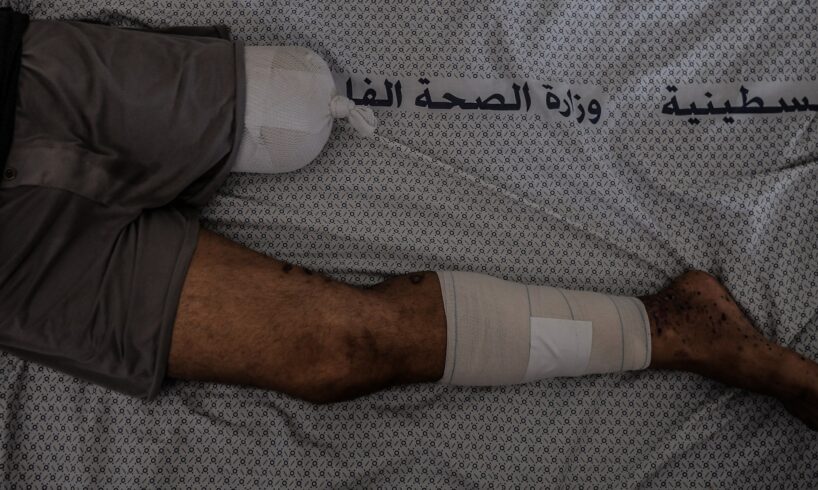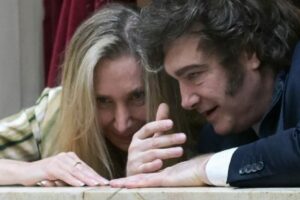
“Ten children a day losing a limb in Gaza, warns UN-backed body”, this is the latest horrific headline to come out of Gaza.
The article reports: “134,105 people including over 40,500 children have suffered new war-related injuries since the war began in October 2023.”
Behind these shocking statistics are real children in real pain who have lost a part of their body, their childhood and their dreams.
My 12-year-old relative Osama is one of them. He escaped death twice, but each time he lost part of his family until only he remained.
The first time, he was at his grandparents’ house, along with his mother, grandmother and sisters. An Israeli air strike hit the home, killing everyone except Osama.
The second time, he was at a school-turned-shelter when Israel bombed it. His father and seven uncles were all killed. Osama survived but lost his leg.
My father and I visited him at Al-Aqsa Hospital to check on him. At the gate of the hospital, a child greeted us; he was selling water in a plastic bag, holding it with one hand; his other hand was amputated. Inside, the scene at the ward where Osama was admitted was gut-wrenching. Dozens of amputees were lying on beds and on the floor.
We found Osama lying in his bed. He spent most of the visit crying. Every movement was difficult for him.
The pain I saw on his face cannot be described. A child who lost his mother, father and his siblings now had to face the trauma and pain of an amputation utterly alone.
He had to rely on the charity of relatives for everything. He was cared for and supported; someone was constantly in search of a wheelchair for him.
But in times of war, taking care of a wounded child who cannot even go to the toilet by himself is an overwhelming weight even for those who love him. Not because they do not want to help, but because they themselves are barely surviving.
Osama knew that. “I want to go to mama and baba … and play in heaven,” he whispered. His words broke my heart.
To be a child without a limb means living an unfair life. It means needing help for every move, every step, every simple activity. It means always feeling different, being looked at with pity or discomfort, watching other children run and play without being able to join. Many, like Osama, have to endure all this without the support of their mom, dad, sisters and brothers.
I cannot begin to comprehend what Osama must feel.
But I do know what I myself felt when I nearly escaped an amputation.
In June last year, our home was attacked and my family and I were all injured. I had shrapnel lodged into various parts of my body, including my hand. I was rushed to the hospital.
My first thought when I heard I needed urgent surgery was that I could lose my hand.
It was my right hand. The hand I use to write my dreams. The one I open my notebooks and hold my books with. The one I use to help my mother, to hold my phone and write to my friends and the relatives I cannot see.
How could I live without it? How would I go on as a writer, as a translator, as a woman who still dared to dream amid all this destruction?
In that moment, I felt what Osama had felt too: Death would be easier than losing a part of my body.
I cried a lot in the hospital. Not only from pain, but from fear of a life in which I might no longer feel whole.
The surgery saved my hand from amputation, but the shrapnel remained inside. They couldn’t remove it; it was too close to the nerve, and they feared damaging it. They said it would stay there … indefinitely.
A piece of shrapnel in the body, like a fragment of painful memory in the mind. A part of the war still living inside me. A piece of destruction, lodged in my body.
I spent two weeks in the surgery ward, the section designated for amputation and limb fracture cases. The place was saturated with pain; not a morning passed without me waking up to the scream of a child crying from the agony of amputation, or the groans of a woman writhing in pain from a wound that refused to heal.
In front of my bed, there was a woman in her 50s who had lost both her arms. She couldn’t even lift a piece of bread to her mouth. Her daughter sat beside her, feeding her with a spoon as if she were a child. Her eyes were filled with tears not just from physical pain, but from that unbearable feeling of helplessness.
I watched her in silence. Her image never left me. To see a human being stripped of their most basic abilities – to eat, to wash themselves, to walk – destroys the soul.
War doesn’t just kill. It steals.
It steals land, homes, loved ones, it still limbs, it steals souls.
The pain doesn’t end when you survive. It begins when you are left to live with what’s missing, what’s broken, with a body that will never be the same.
And if death sometimes feels easier than losing a part of your body, then the life we choose to live afterwards is resistance in its purest form.
The views expressed in this article are the author’s own and do not necessarily reflect Al Jazeera’s editorial stance.





